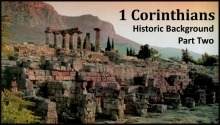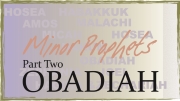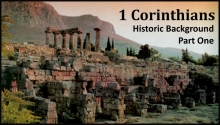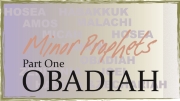The Message Spreads

“Jesus said ‘Come to me, all you who are weary and burdened, and I will give you rest’ (Matthew 11.28). I am so thankful that Jesus did not call us to a list of rules or a religious agenda or even to church. He called us into a relationship with Himself.” So states Rich Blum, pastor of Bethel Community Church in Washougal, WA. Each Sunday Think-Biblically.com is bringing you sermons from Pastor Rich to assist you in your worship of God and to grow in your relationship with Jesus. Sermons also aired on KPDQ-FM AM 1130 in Portland, OR.
Read more: The Message Spreads
Created in His Image

“Jesus said ‘Come to me, all you who are weary and burdened, and I will give you rest’ (Matthew 11.28). I am so thankful that Jesus did not call us to a list of rules or a religious agenda or even to church. He called us into a relationship with Himself.” So states Rich Blum, pastor of Bethel Community Church in Washougal, WA. Each Sunday Think-Biblically.com is bringing you sermons from Pastor Rich to assist you in your worship of God and to grow in your relationship with Jesus. Sermons also aired on KPDQ-FM AM 1130 in Portland, OR.
Read more: Created in His Image
Haggia and Zechariah, Part One

Haggai identifies himself as a prophet (1.1) and Ezra the priest corroborates this (Ezra, 5.1). The prophet Haggai has taken careful steps to date his messages (1.1, .15; 2.1, .10, .18, .20), 520 B.C. by the modern calendar. He is a prophet to the returned exiles of Judah.
Read more: Haggia and Zechariah, Part One
Micah

When the prophet Jeremiah prophesied Assyria’s routing of Israel and Judah, he was promptly arrested and tried for treason. While the council debated his fate, most being in favor of Jeremiah’s execution, one councilman was godly enough to have recalled for the others a passage of God’s Word. He recited Micah, showing that when the prophet of old spoke those same words a century ago, he was not arrested for treason. Instead, he recalled, the people repented and the Lord relented his wrath. The council agreed to follow the precedent of Micah and spared Jeremiah’s life. These events show that God’s word certainly lead to life.
Read more: Micah
Historic Background of 1 Corinthians, Part 2

Upon his arrival in Corinth, Paul met new friends, a Jewish couple, Aquila and Priscilla by name. They were from Rome, originally, but relocated to Corinth when Claudius (who reigned AD 41 to 54) “had ordered all the Jews to leave Rome.” This edict was pronounced in AD 49 or 50, though the circumstances are largely unknown. According to Suetonis, a Roman biographer of emperors, there was a constant series of Jewish riots. The reason for these riots is uncertain, but appeared to center around an individual named Chrestus.
Read more: Historic Background of 1 Corinthians, Part 2
Malachi

Nothing more than the name Malachi is known of the author of this message. As a result, some have concluded that “Malachi,” which means “my messenger,” is merely a title for the work, rather than the prophets actual name. However, it would be unusual for a canonized text to endure the centuries without the author’s name. Further, historic tradition holds that a prophet named Malachi was a member of the Nehemiah’s Great Synagogue. This would place Malachi during Nehemiah’s time, about 430 B.C.
Read more: Malachi
Habakkuk

Besides the facts that Habakkuk was a man of deep and intense faith, rooted in religious tradition and a contemporary of Jeremiah, not much is known of him. His name is from a root Hebrew word meaning “to embrace,” a fitting name for Habakkuk if applied to his action toward YHWH. In 3.19 Habakkuk leaves instruction for the “director of music,” indicating that he may have been a Levite Musician. In the Apocrypha there is a legend regarding Habakkuk (
The History of the Destruction of Bel and the Dragon):
Read more: Habakkuk
Obadiah - Part Two

Yesterday we examined the historic background of the book of Obadiah, today we’ll take a detailed look at the book itself.
Read more: Obadiah - Part Two
Historic Background of 1 Corinthians, Part One

SANCTUARY IN CORINTH During his second missionary journey, while on the run from murderous Jews, Paul found sanctuary in Corinth (about CE 51). Corinth was an unlikely rest stop for many reasons. First, being strategically located at a narrow channel of land between the Mediterranean and the Ionian Sea (see illustration 1), it controlled the province of Achaia. As such an important crossroads of the Roman Empire, it was one of the largest cities of its day – second only to Rome – with a population of 100,000 (80,000 in the city proper, and 20,000 in the immediate suburbs).
Read more: Historic Background of 1 Corinthians, Part One
Haggia and Zechariah, Part Two

Once the Jews returned to their land, their first priority was to rebuild the temple of YHWH. Persian officials who were willing to put up with the kings edict though they disagreed with it, saw the reconstruction project a waste of time and resources. Threatened with legal injunctions, the Jews stopped the construction and began to rebuild the rest of the nation. This went on for 15 years before God said, “Enough! Finish my temple.” God saw the Persian threat as an excuse to enjoy the good life, rather than a reason to discontinue the building project.
Read more: Haggia and Zechariah, Part Two
Zephania

To appreciate Zephania’s ministry a brief history is in order. Earlier in Judah’s history there was a king named Manasseh. Manasseh was by far the most evil king to have ever ruled over Judah, and he also reigned longer than any other king (55 years). “He did evil in the eyes of the Lord,” states 2 Kings 21.2, and then the author continues to recount the sins of King Manasseh:
Read more: Zephania
Minor Prophets - Obadiah

There are a grand total of 11 other Obadiah’s mentioned in the Old Testament, including an officer in King David's service, a servant of King Ahab’s, a Levite who lived under King Josiah, and a civil leader who returned from Ezra to begin post-exilic restructuring of the nation. None of these men, however, or any of the other eight wrote the book bearing this name. Nothing much is known about the author of Obadiah, other than that his name means “Worshiper of YHWH.”
Read more: Minor Prophets - Obadiah












